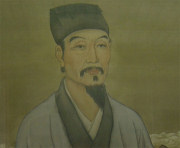
| Wu Cheng-en , courtesy name Ruzhong , pen name "Sheyang Hermit," was a Chinese novelist and poet of the Ming Dynasty, best known for being the probable author of one of the Four Great Classical Novels of Chinese literature, Journey to the West. Wu was born in Lianshui, in Jiangsu province, and later moved to nearby Huaian. Wu's father, Wu Rui, had had a good primary education and "shown an aptitude for study," but ultimately spent his life as an artisan because of his family's financial difficulties. Nevertheless, Wu Rui continued to "devote himself to literary pursuits," |
and as a child Wu Cheng-en acquired the same enthusiasm for literature—including classical literature, popular stories, and anecdotes. Wu Cheng-en was known early in life for his literary leanings. Nevertheless, Wu repeatedly failed the civil service exams. He was 63 years old when he was appointed to the post of Vice Magistrate in Changxing county, but after only two years was thrown into prison on a trumped-up charge of corruption. The details of the case were eventually brought to light and Wu was offered another position but did not take it up. Wu remained poor throughout his life, however, and did not have any children; dissatisfied with the political climate of the time and with the corruption of the world, he spent much of his life as a hermit. |